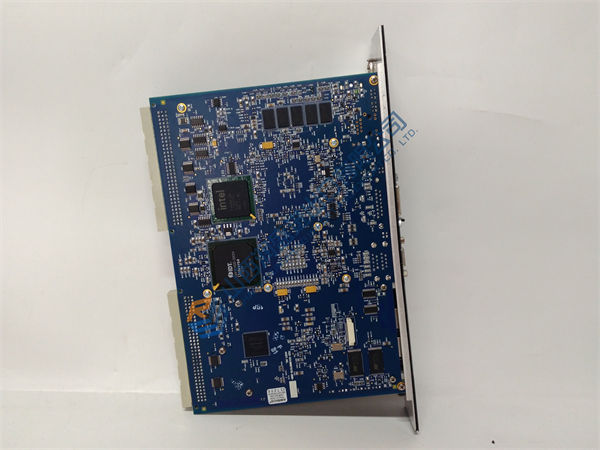Description:
The Alstom ICP232 029.359325 is a specialized control module designed for a wide range of industrial automation applications. It serves as a versatile component crucial for various industrial processes and systems, known for its reliability, precision, and compatibility with diverse equipment. This module likely handles data acquisition, signal processing, and control output functions within larger control systems.
Application Scenarios:
The Alstom ICP232 029.359325 is a versatile controller that can be found in several key industrial sectors:
- Industrial Automation: Used extensively in various automation systems for tasks such as process control, data acquisition, and monitoring. For example, in a manufacturing plant, it could control specific segments of an assembly line, monitor sensor data from machinery, and ensure precise timing of operations.
- Railway Systems: Employed in railway signaling and control systems. This could include controlling track switches, managing signal lights, or monitoring train movements to ensure safety and efficiency across the network.
- Energy Generation: Integrated into power generation equipment for monitoring and control. This might involve overseeing parameters in a power plant, managing auxiliary systems, or providing control signals for turbines or generators.
- Manufacturing: Utilized in manufacturing processes for automation and optimization. This could range from controlling robotic arms to managing temperature and pressure in chemical reactors, ensuring consistent product quality and efficient production.
Parameter:
Technical Principles and Innovative Values:
The Alstom ICP232 029.359325 controller brings several technical principles and innovative values to industrial control:
- Real-time Control and Precision: The module’s 225 MHz frequency allows for high-speed data processing and real-time control. This is crucial for applications where rapid response to sensor inputs and precise execution of control outputs are necessary to maintain system stability and optimize performance.
- Reliable Data Acquisition: It is designed to accurately acquire data from various sensors and industrial instruments. This reliability in data acquisition ensures that the control algorithms receive precise information, leading to more effective decision-making and control actions.
- Robustness for Industrial Environments: Constructed with high-quality materials, the module is built to withstand the demanding conditions often found in industrial settings, including temperature variations, vibrations, and electrical noise. This durability ensures long-term, reliable operation.
- Seamless Integration with Alstom Systems: Its primary value lies in its compatibility and seamless integration with other Alstom components and larger control systems. This reduces complexity in system design and commissioning, as it’s part of a cohesive ecosystem. While the query mentioned ABB, the information points to Alstom as the manufacturer of this specific controller, implying its role within Alstom’s automation and energy solutions.
Application Cases and Industry Value:
In a power plant’s turbine control system, an aging controller was causing intermittent communication failures and reduced precision in turbine speed regulation, leading to efficiency losses and increased wear on mechanical components. The plant decided to upgrade the control system, incorporating the Alstom ICP232 029.359325 modules.
The ICP232 029.359325 modules were deployed to manage the interface between the turbine’s sensors (monitoring speed, vibration, temperature) and the main control logic. During operation, the new controllers provided highly accurate and reliable data acquisition, feeding precise real-time information to the turbine’s governor system. This enabled the governor to maintain turbine speed within much tighter tolerances, optimizing power generation efficiency and reducing mechanical stress. As a result, the power plant reported a 3% improvement in overall turbine efficiency and a significant reduction in unscheduled maintenance attributed to control system issues. This case demonstrates how the Alstom ICP232 029.359325 significantly enhances operational reliability, optimizes performance, and contributes to substantial cost savings in critical energy infrastructure.
Related Product Combination Solutions:
The Alstom ICP232 029.359325 would typically integrate with a range of other Alstom or compatible industrial automation components:
- Alstom PLC Systems: It likely serves as an I/O module or a specialized control board within larger Programmable Logic Controller (PLC) systems from Alstom.
- Industrial Sensors and Actuators: The controller would interface directly with various industrial sensors (e.g., temperature, pressure, flow sensors) to acquire data, and with actuators (e.g., valves, motors, relays) to execute control commands.
- Human-Machine Interfaces (HMIs) / SCADA Systems: For operator interaction and system visualization, the controller would communicate with HMIs or integrate into a larger SCADA (Supervisory Control and Data Acquisition) system.
- Industrial Communication Modules: It may connect to other communication modules (e.g., Ethernet, Profibus) to enable data exchange across the industrial network.
- Power Supplies: Requires a stable and compatible power supply (e.g., 5VDC, 15VDC, 24VDC) as per its specifications.
Installation, Maintenance, and Full-Cycle Support:
The Alstom ICP232 029.359325 is designed for straightforward installation and reliable, low-maintenance operation in industrial settings. Its compact form factor and standard mounting options (though not explicitly stated, typically DIN-rail or panel mount) facilitate easy integration into control cabinets. Proper environmental conditions, including controlled temperature, humidity, and protection from dust or corrosive substances, are recommended to ensure its long-term performance.
Routine maintenance for the ICP232 029.359325 is minimal, primarily involving visual inspections to ensure secure connections and a clean operating environment. As a solid-state electronic module, it has no moving parts and is built for continuous operation with high reliability. Its robust design contributes to a long operational lifespan, reducing the need for frequent servicing. In the event of a fault, the modular design often allows for quick replacement, minimizing downtime for the overall system. For full-cycle support, users should refer to Alstom’s official documentation and support channels, which typically include technical specifications, troubleshooting guides, and spare parts availability, ensuring continued performance and reliability throughout the product’s life.








